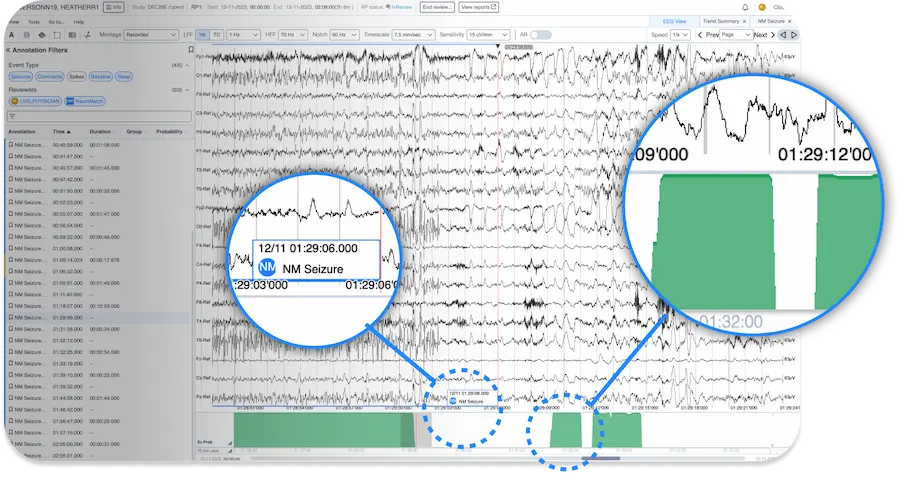The field of neuroscience is experiencing a significant transformation, largely due to the advent of innovative technologies such as NeuroMatch. Developed by LVIS Corporation, NeuroMatch is a state-of-the-art tool that leverages artificial intelligence and advanced neural information analysis to enhance brain research and diagnostics. This tool is instrumental in improving our understanding of brain functions, enabling more accurate diagnoses of neurological disorders, and supporting the development of innovative treatments. This article explores the profound impact of NeuroMatch on neuroscience and its potential for the future of brain health.
The Core of NeuroMatch
Neuromatch is designed to decode complex brain networks and interactions. It integrates multiple neuroimaging techniques, including EEG (electroencephalography), fMRI (functional magnetic resonance imaging), and MEG (magnetoencephalography), to offer a comprehensive analysis of brain activity. With its sophisticated algorithms and machine learning capabilities, NeuroMatch identifies patterns and correlations that traditional methods often miss.
Key Features and Benefits
- High-Resolution Brain Mapping
- NeuroMatch provides detailed, high-resolution mapping of brain networks, allowing researchers to observe neural changes with exceptional clarity. This is crucial for identifying specific areas involved in various brain functions and disorders.
- Real-Time Monitoring
- The ability to monitor brain activity in real-time is one of NeuroMatch’s standout features. This dynamic analysis is essential for studying how neural connections change during different activities and therapies, shedding light on brain plasticity and function.
- Multimodal Data Integration
- By integrating data from multiple neuroimaging techniques, NeuroMatch offers a holistic view of brain activity. This multimodal approach enhances the accuracy of research and diagnostics by combining the strengths of each method.
- Predictive Analysis
- With its machine learning capabilities, NeuroMatch can predict changes in neural connections over time. This predictive ability is particularly valuable for developing personalized treatment plans and understanding the progression of neurological disorders.
Applications in Neuroscience Research
NeuroMatch’s capabilities have broad applications in various areas of neuroscience research:
- Neuroplasticity Studies
- Neuroplasticity, the brain’s ability to reorganize itself, is a key research area. NeuroMatch’s real-time monitoring and high-resolution mapping enable detailed studies of neuroplasticity, helping researchers understand how the brain adapts and changes in response to various stimuli.
- Cognitive Function Research
- Understanding cognitive functions like memory, learning, and attention is crucial for developing interventions for cognitive impairments. NeuroMatch provides detailed insights into the neural basis of these functions, aiding both research and practical applications.
- Mental Health Research
- Many mental health conditions, such as depression, anxiety, and schizophrenia, are linked to changes in brain networks. NeuroMatch helps identify these changes and assess the effectiveness of treatments aimed at restoring healthy brain function.
- Neurodevelopmental Disorders
- Conditions like autism and ADHD involve atypical neural development. NeuroMatch aids in understanding these differences and developing interventions to support neurodevelopment.
Enhancing Neurology Diagnostics
NeuroMatch also plays a significant role in improving neurology diagnostics:
- Early Detection
- NeuroMatch’s high-resolution and real-time monitoring capabilities allow for the early detection of neurological disorders. Early diagnosis can lead to timely interventions, improving patient outcomes.
- Differential Diagnosis
- NeuroMatch can differentiate between various neurological conditions with similar symptoms. This precision helps tailor treatments to the specific needs of each patient, enhancing therapeutic effectiveness.
- Monitoring Disease Progression
- For chronic neurological conditions, NeuroMatch provides continuous monitoring of disease progression and treatment efficacy. This helps in adjusting therapies to achieve better results and manage the disease more effectively.
- Supporting Personalized Medicine
- By analyzing individual neural data, NeuroMatch supports personalized treatment plans. This approach maximizes the effectiveness of interventions by considering the unique neural characteristics of each patient.
Future Directions
The future of brain research and diagnostics looks promising with NeuroMatch. Potential future applications include:
- Brain-Computer Interfaces (BCIs)
- NeuroMatch could play a crucial role in developing BCIs that rely on understanding and harnessing brain activity for communication and control.
- AI-Driven Therapy Optimization
- NeuroMatch’s predictive capabilities could be used to develop AI-driven platforms that optimize therapeutic interventions in real-time based on ongoing neural changes.
- Global Collaboration in Research
- By providing a standardized tool for neural data analysis, NeuroMatch can facilitate global collaboration in neuroscience research, leading to more comprehensive and diverse studies.
- Advancements in Neuroimaging
- Ongoing advancements in neuroimaging technology and data analysis methods will further enhance NeuroMatch’s capabilities, providing even more detailed and accurate insights into brain function and health.
Conclusion
NeuroMatch is revolutionizing the field of neuroscience by providing advanced tools for brain research and diagnostics. Its high-resolution brain mapping, real-time monitoring, multimodal data integration, and predictive analysis capabilities make it an invaluable asset for researchers and clinicians alike. By enhancing our understanding of the brain and improving the accuracy of neurological diagnoses, NeuroMatch holds the promise of better treatments and outcomes for individuals with neurological conditions.




Visit the site PSM Makassar
Click to read Arema FC
I’m not sure where you’re getting your information, but great
topic. I needs to spend some time learning more or understanding more.
Thanks for fantastic information I was looking for this information for my mission.
https://phcity-ph.com
Hey! Someone in my Facebook group shared this site with us so I came to check it out. I’m definitely enjoying the information. I’m bookmarking and will be tweeting this to my followers! Superb blog and amazing style and design.
Woah! I’m really digging the template/theme of this website. It’s simple, yet effective. A lot of times it’s challenging to get that “perfect balance” between usability and visual appeal. I must say you have done a excellent job with this. Also, the blog loads very fast for me on Internet explorer. Exceptional Blog!
Incredible points. Outstanding arguments.
Keep up the amazing work.
https://bet-7-br.com
This is a topic which is close to my heart… Many thanks! Exactly where are your contact details though?
Very good write-up. I definitely love this website. Thanks!
https://cbet-88.com
Hey just wanted to give you a quick heads up. The words in your article seem to be running off the screen in Safari. I’m not sure if this is a format issue or something to do with internet browser compatibility but I figured I’d post to let you know. The design look great though! Hope you get the issue solved soon. Cheers
I love what you guys tend to be up too. This sort of clever work and reporting! Keep up the good works guys I’ve incorporated you guys to my blogroll.
Hi there! Someone in my Myspace group shared this website with us so I came to take a look. I’m definitely enjoying the information. I’m book-marking and will be tweeting this to my followers! Wonderful blog and amazing style and design.
Hey there just wanted to give you a quick heads up. The words in your article seem to be running off the screen in Firefox. I’m not sure if this is a formatting issue or something to do with browser compatibility but I figured I’d post to let you know. The layout look great though! Hope you get the issue fixed soon. Cheers
O mundo dos jogos cabe na sua mão com o app da https://peixe-beta.com. Com carregamento rápido, as
apostas são feitas sem erros. Interface limpa
e sem distrações. Atualizações frequentes
garantem melhorias.
Want to better understand how to play blackjack at a casino?
You’ve come to the right place. We offer honest advice, updated facts,
and casino options that prioritize safety,
fairness, and massive rewards. Each platform we recommend is licensed, secure, and offers bonuses that actually benefit the players.
From welcome packages to ongoing promos, we help you get more value while
enjoying fair play and exciting online gaming adventures.
Explore the topic of is chumba casino legit and get insider insights that truly matter.
We’re committed to fairness, accuracy, and player-focused content.
All our featured casinos follow strict compliance standards and come loaded with generous sign-up offers and rewards.
Learn how to enjoy gambling safely while
taking advantage of bonuses, high-return games, and trusted services
designed for both beginners and professionals alike.
Curious about how to win at the casino with $20?
Discover everything you need to know with our expert-approved guides.
We focus on fair gameplay, responsible gambling, and secure platforms you can trust.
Our recommendations include casinos with top-rated bonuses, excellent support,
and real player reviews to help you get the most out of every experience.
Whether you’re new or experienced, we make sure you play smarter with real chances to win and safe environments.